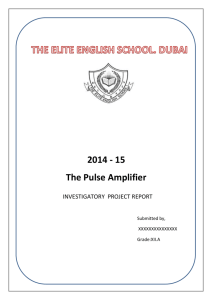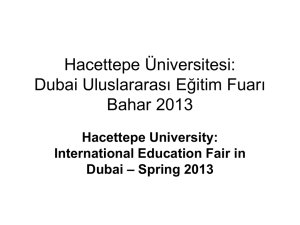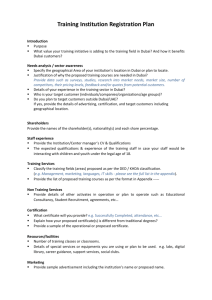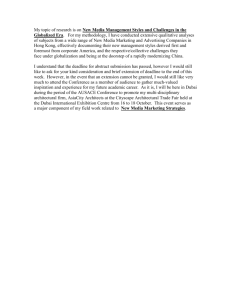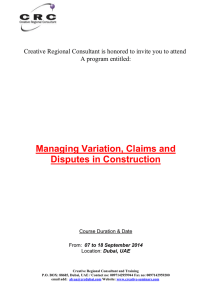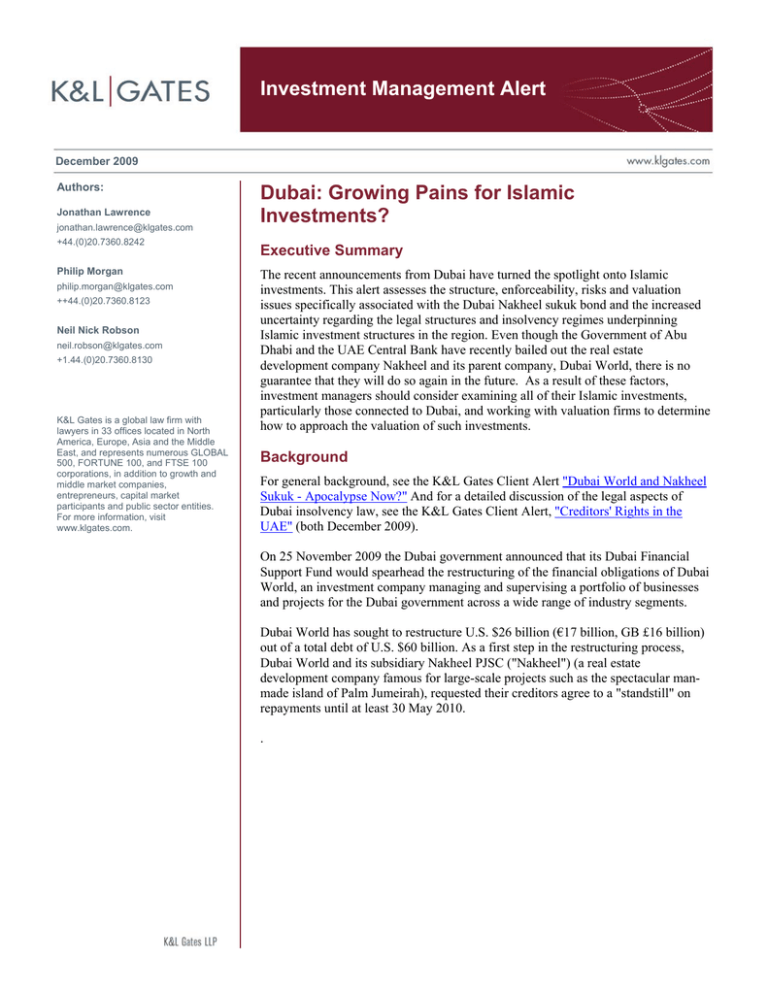
Investment Management Alert
December 2009
Authors:
Jonathan Lawrence
jonathan.lawrence@klgates.com
+44.(0)20.7360.8242
Philip Morgan
philip.morgan@klgates.com
++44.(0)20.7360.8123
Neil Nick Robson
neil.robson@klgates.com
+1.44.(0)20.7360.8130
K&L Gates is a global law firm with
lawyers in 33 offices located in North
America, Europe, Asia and the Middle
East, and represents numerous GLOBAL
500, FORTUNE 100, and FTSE 100
corporations, in addition to growth and
middle market companies,
entrepreneurs, capital market
participants and public sector entities.
For more information, visit
www.klgates.com.
Dubai: Growing Pains for Islamic
Investments?
Executive Summary
The recent announcements from Dubai have turned the spotlight onto Islamic
investments. This alert assesses the structure, enforceability, risks and valuation
issues specifically associated with the Dubai Nakheel sukuk bond and the increased
uncertainty regarding the legal structures and insolvency regimes underpinning
Islamic investment structures in the region. Even though the Government of Abu
Dhabi and the UAE Central Bank have recently bailed out the real estate
development company Nakheel and its parent company, Dubai World, there is no
guarantee that they will do so again in the future. As a result of these factors,
investment managers should consider examining all of their Islamic investments,
particularly those connected to Dubai, and working with valuation firms to determine
how to approach the valuation of such investments.
Background
For general background, see the K&L Gates Client Alert "Dubai World and Nakheel
Sukuk - Apocalypse Now?" And for a detailed discussion of the legal aspects of
Dubai insolvency law, see the K&L Gates Client Alert, "Creditors' Rights in the
UAE" (both December 2009).
On 25 November 2009 the Dubai government announced that its Dubai Financial
Support Fund would spearhead the restructuring of the financial obligations of Dubai
World, an investment company managing and supervising a portfolio of businesses
and projects for the Dubai government across a wide range of industry segments.
Dubai World has sought to restructure U.S. $26 billion (€17 billion, GB £16 billion)
out of a total debt of U.S. $60 billion. As a first step in the restructuring process,
Dubai World and its subsidiary Nakheel PJSC ("Nakheel") (a real estate
development company famous for large-scale projects such as the spectacular manmade island of Palm Jumeirah), requested their creditors agree to a "standstill" on
repayments until at least 30 May 2010.
.
Investment Management Alert
The most urgent problem facing Dubai World was a
U.S. $3.52 billion sukuk1 bond (the world’s biggest),
which Dubai World had guaranteed and which is
issued by Nakheel - maturing on 14 December 2009,
along with its two other outstanding sukuk with a
par value of about U.S. $1.75 billion.
Structure of The Nakheel Sukuk
The Nakheel sukuk would most accurately be
termed "Islamic investment certificates". The sukuk
holders each hold an undivided beneficial ownership
interest in the underlying assets. Sukuk holders are
entitled to share both the revenues generated by and
the proceeds of realisation of the assets. The legal
structure and format of sukuk certificates may be
considered analogous to U.S. trust certificates;
sukuk certificates may be listed and rated.
Nakheel's obligations under the U.S. $3.52 billion
sukuk, due on 14 December 2009, were guaranteed
by Dubai World by way of an English law
guarantee. There was no guarantee of Dubai World
from the Government of Dubai, although certain
investors and banks who invested in the sukuk
contend that there was an implicit one. Nakheel
sukuk holders were granted a share pledge of
18.89% in aggregate of the outstanding equity in
Nakheel at the time the sukuk was originated.
Looking ahead, there are a further two sukuk issued
by the company: the Nakheel 2 sukuk due on 13
May 2010 for U.S. $980 million and the Nakheel 3
1
Sukuk are Islamic financial instruments that have an overall
economic effect similar to conventional bonds. They can be
used for raising money in the capital markets and represent an
undivided ownership share in an underlying asset or interest
held by the issuer. Sukuk are used in combination with other
Islamic-compliant financing techniques to give rise to a return
on the underlying asset (in Nakheel's case these are real
estate assets). In a typical sukuk structure the entity looking to
raise funds (the originator or seller) establishes a special
purpose vehicle (the SPV issuer) in a suitable tax jurisdiction.
The SPV issuer issues the sukuk certificates to investors and
the SPV issuer uses the issue proceeds to buy the underlying
assets from the originator, which it usually holds under an
English law trust in favour of the sukuk holders. The ownership
share in the underlying assets, represented by the sukuk
certificates, entitles the sukuk holders to a proportionate share
of the returns generated by the assets. In this type of sukuk
(known in Islamic law as a 'sukuk al ijara') the underlying
assets are leased, giving the SPV issuer a return on the asset
in the form of rent.
sukuk due on 16 January 2011 for U.S. $750
million.
The Nakheel sukuk was set up as a 'sukuk al ijara'
sukuk based on two plots of land in Dubai, which
were initially valued at U.S. $4.22 billion (based on
developments to be constructed on those plots).
Long-term leases were transferred to the SPV
issuer. The plots were then leased back to Nakheel
for the term of the sukuk for the U.S. $3.52 billion
amount raised. For the term of the sukuk, Nakheel
is due to make lease payments corresponding to
periodic payment amounts on the sukuk. Half of the
lease amount was to be paid to sukuk holders
(through the SPV issuer) and half was to be deferred
until maturity.
Enforceability
The sukuk documentation is governed by English
law and is subject to the non-exclusive jurisdiction
of the English courts. However, the structure of the
sukuk has been established in accordance with
Islamic principles. The Nakheel sukuk prospectus
(the "Prospectus") warned that the Dubai courts are
not bound to enforce English judgments without reexamining the merits of the case:
"The Declaration of Trust is governed by
English law and is subject to the non-exclusive
jurisdiction of the English courts. The laws of the
Emirate of Dubai and (to the extent applicable in the
Emirate of Dubai) the federation of the UAE (UAE
law) do not recognise the concept of trust or
beneficial interests and, accordingly, there is no
certainty that the terms of the Declaration of Trust
would be enforced by the courts of Dubai. The
concept of agency is, however, recognised under
UAE law."
The Nakheel sukuk holders, as creditors of Dubai
World through the guarantee, are effectively
subordinated to the creditors of the other
subsidiaries of Dubai World. The Prospectus states:
"Dubai World is a holding company. As
such, Dubai World is dependent on the operations
of and cash flows generated by its subsidiaries.
Therefore any claim that may be made by a creditor
on Dubai World will effectively be structurally
subordinate to any claims made by creditors directly
on Dubai World's subsidiaries."
December 2009
2
Investment Management Alert
Sukuk holders were granted a mortgage over the two
properties but there is uncertainty as to how these
could be enforced under Dubai law. Investors cannot
touch the assets of the Government, as detailed in
the Prospectus:
"In addition, Law No. 10 of 2005 amending
Government Lawsuit Code No. (3) of 1996 (as
amended by Law No. 4 of 1997) provides that an
establishment of the Government may be sued, but
that no debt or obligation of such establishment may
be recovered by way of an attachment on its
properties or assets."
As mentioned above, the concepts of trust and
beneficial interest on which the entire sukuk is
structured under English law are not recognised in
Dubai. The sukuk therefore used a Security Agent
as a domestic agent for mortgage enforcement. The
Prospectus states:
"There is an absence of precedent or
authority as how a court would construe Law No. 3
of 2006 and, accordingly, there can be no assurance
in respect of Dubai World's or the Co-Obligors'
entitlement to immunity in any attachment or
enforcement action, whether relating to the
Mortgages, the Share Pledge or otherwise. The
Dubai Lands Department (the Governmental of
Dubai's property registration authority) will register
mortgages in favour of UAE licensed banks or
persons. Further the Dubai Lands Department will
not register a mortgage, inter alia, if a bank
mortgagee is not licensed to operate in the UAE.
The Security Agent is licensed to operate in the
UAE. However, in the absence of clear judicial or
legislative guidance or clarification on the
arrangement contemplated by the Security Agency
Agreement there can be no assurance of the
enforceability of the Mortgages by the Security
Agent in the manner contemplated by the Security
Agency Agreement or any enforcement process or
procedure."
There are many uncertainties about the assets
available to and enforcement methods at the disposal
of Nakheel sukuk investors. They will need to assess
the new Dubai Government decree based on the
bankruptcy law at the Dubai International Financial
Centre (see further below).
One of the main principles of Islamic finance is that
physical assets should underpin transactions in order
to avoid pure financial speculation. However, the
Nakheel sukuk shows that the value of physical
assets is diminished or non-existent if local laws
prohibit recourse to those assets as security.
Abu Dhabi to the Rescue?
On 14 December 2009 the Government of Dubai,
acting through the Supreme Fiscal Committee,
announced a series of actions in relation to Dubai
World and Nakheel in a decree (the "Decree"):
1. The Government of Abu Dhabi and the
UAE Central Bank agreed to provide U.S.
$10 billion to the Dubai Financial Support
Fund to satisfy the upcoming obligations of
Dubai World.
2. Of the U.S. $10 billion, the Government of
Dubai would use U.S. $4.1 billion to pay
the Nakheel sukuk obligations; the
remaining funds are to be used to provide
for interest expenses and working capital of
Dubai World until 30 April 2010 (although
this is conditional on Dubai World
successfully negotiating its standstill).
Trade creditors and contractors would also
be paid.
3. The UAE Central Bank was prepared to
provide support to local UAE banks.
4. The Government of Dubai would announce
a comprehensive reorganisation law, which
will be available if Dubai World and its
subsidiaries are unable to achieve an
acceptable restructuring of their remaining
obligations.
All of these measures clearly highlight Dubai's
dependence on its oil-rich neighbour. However,
notwithstanding this, the payment of the sukuk debt
should avoid the cross-defaults that would have
arisen with Dubai World's own debt had it been
forced to make good on the guarantee it gave under
the sukuk.
December 2009
3
Investment Management Alert
The Decree also includes provisions for creditor
rights and avoids untested UAE laws, which are seen
as unsuitable for large-scale insolvencies. The
actions do not answer medium-term and long-term
concerns about how other regional Islamic and nonIslamic investments would be treated if they were
also to run into trouble.
A new public finance law was issued in Dubai on 17
December 2009 covering all governmental
departments and includes government companies
that have tapped credit markets, such as the state
holding company Investment Corporation of Dubai
(which owns Emirates Airlines and a one-third share
in Emaar Properties, a real estate development
company). The new law requires government
entities to transfer their surpluses to the treasury and
sets criteria for public spending. However, it is
explicitly stated in the law that "the law does not in
any way relate to government-related entities such as
Dubai World and Dubai Holding".
Is The Security Sufficient?
One of the key principles in Islamic finance is the
sharing of risk by all parties to a transaction. Hence,
if the value of the asset sold to the SPV company
declines significantly (like the two properties
backing the Nakheel sukuk), the repurchase
agreement should not be fixed at par if the company
defaults on the sukuk.
In the case of the Nakheel sukuk, the asset was
valued at U.S. $4.2 billion, based on the
development plan for the land that backed the sukuk
and also on assumptions about the timeframe for that
development (there was a discount rate used for
future value to bring it back to present value).
Perhaps, in this case, the Ijara (lease type) structure
may not have been appropriate in the first place, as
there was never a physical asset that was worth the
price it was sold for when the sukuk was issued.
In summary, there is no history of sukuk defaults
and everyone involved with the Nakheel sukuk is in
uncharted territory; nobody has any real idea about
what might happen if Nakheel were to default and
investors were forced to recover their money in an
enforcement situation.
Some Valuation Implications for Fund
Managers
In the light of the foregoing, investment managers
should consider examining all their Islamic
investments, particularly those connected to Dubai,
and working with valuation firms to determine how
to approach the valuation of such investments.
Circumstances may require a downward revaluation
of any investments in Dubai government- related
entities, as discussed above, if the Government of
Abu Dhabi and the UAE Central Bank are not
currently legally obliged to stand behind them. The
real risk associated with these investments (and the
fair assessment of their value) needs to be assessed
in the light of Dubai's recent problems. The risk of
default by quasi-sovereign vehicles, such as
Nakheel, appears now to be quite large. Creditors
should be aware that, if the Government of Abu
Dhabi and the UAE Central Bank choose not to
conduct another bail-out, there may be a substantial
risk of not being able to realise any security
associated with the sukuk issue, since investors are
prohibited by Dubai law from touching the assets of
the Dubai government (and by association its
investment entities). There are many uncertainties
about the assets available and enforcement methods
at the disposal of Nakheel sukuk investors.
These issues should be considered in light of the
fact that regulators and trade bodies have placed
valuation at the top of the regulatory agenda. For
example:
•
The then -FSA director of retail policy, Dan
Waters, said in March 2007 that "regulators
around the world have long sought to ensure
that the net asset value of publicly traded, mass
market funds - such as mutual funds in the U.S.
and UCITS in Europe - is rigorously controlled,
to ensure that fair value is achieved for the
underlying investors dealing in the funds."
•
In 2007 the International Organization of
Securities Commissions ("IOSCO") published
its valuation principles for hedge funds and
focused on documented policies and
procedures, identification of methodologies to
be used, consistent valuations, periodic reviews,
independent review, the handling and
December 2009
4
Investment Management Alert
documenting of any price overrides, due
diligence on third parties appointed to perform
valuation services and transparency to investors.
•
Credit Suisse was fined a record GB £5.6m in
summer 2008 by the FSA following a scandal in
which rogue traders in its investment banking
division deliberately mispriced the asset-backed
securities they held.
•
The FSA's Dan Waters has more recently
commented: "In the current market turmoil, in
which valuing illiquid assets has been and
remains a significant challenge, it is more
important than ever that robust valuation
methodologies and practices are in place,
carefully monitored and made transparent to
investors".
•
The U.S. Securities and Exchange Commission
(“SEC”) inspection and compliance staff has
repeatedly listed advisers’ valuation of
investments as a major area of focus,
particularly as a result of the uncertainty created
by recent market conditions.
The SEC’s Director of Enforcement, Robert
Khuzami, noted in a November 2009 speech that
inflated valuations are a focus of the Division’s
efforts to combat credit crisis-related misconduct
and has stated that valuation will be an area of
consideration for the Division’s Asset Management
Unit, which is currently being formed to focus on
investment advisers and both registered and
unregistered funds.
Conclusion
Even though the Government of Abu Dhabi and the
UAE Central Bank have recently bailed out Dubai
World and Nakheel, there is no guarantee that they
will do so again. Furthermore, it is apparent now
both that Dubai's financial position has changed
significantly and that there is increased uncertainty
regarding the legal structures and insolvency
regimes underpinning Islamic investment structures
in the region. In the light of these developments,
investment managers should consider examining all
their Islamic investments, particularly those
connected to Dubai and working with valuation
firms to determine how to approach the valuation of
such investments.
Anchorage Austin Beijing Berlin Boston Charlotte Chicago Dallas Dubai Fort Worth Frankfurt Harrisburg Hong Kong London
Los Angeles Miami Newark New York Orange County Palo Alto Paris Pittsburgh Portland Raleigh Research Triangle Park
San Diego San Francisco Seattle Shanghai Singapore Spokane/Coeur d’Alene Taipei Washington, D.C.
K&L Gates is a global law firm with lawyers in 33 offices located in North America, Europe, Asia and the Middle East, and represents numerous
GLOBAL 500, FORTUNE 100, and FTSE 100 corporations, in addition to growth and middle market companies, entrepreneurs, capital market
participants and public sector entities. For more information, visit www.klgates.com.
K&L Gates comprises multiple affiliated partnerships: a limited liability partnership with the full name K&L Gates LLP qualified in Delaware and
maintaining offices throughout the United States, in Berlin and Frankfurt, Germany, in Beijing (K&L Gates LLP Beijing Representative Office), in
Dubai, U.A.E., in Shanghai (K&L Gates LLP Shanghai Representative Office), and in Singapore; a limited liability partnership (also named K&L
Gates LLP) incorporated in England and maintaining offices in London and Paris; a Taiwan general partnership (K&L Gates) maintaining an office in
Taipei; and a Hong Kong general partnership (K&L Gates, Solicitors) maintaining an office in Hong Kong. K&L Gates maintains appropriate
registrations in the jurisdictions in which its offices are located. A list of the partners in each entity is available for inspection at any K&L Gates office.
This publication is for informational purposes and does not contain or convey legal advice. The information herein should not be used or relied upon
in regard to any particular facts or circumstances without first consulting a lawyer.
©2009 K&L Gates LLP. All Rights Reserved.
December 2009
5

